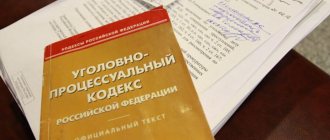Principles and objectives of judicial proceedings
After the case has been investigated and charges have been brought against specific defendants, criminal proceedings are sent to court. According to established legislation, judicial proceedings are the final stage of criminal proceedings. The consideration of one case can be carried out in the courts of the first, second and supervisory instances, but in the traditional sense, a trial means a court of the first level, which can bring charges. The Court of Appeal and the Supreme Court cannot accuse the subjects of the offense; they can confirm the decision of the first court or refute it.
The purpose of judicial proceedings is to establish the truth and objectively resolve the relationship between the state and the offender. The task of the judge, accordingly, will be to establish the fact of an offense, analyze evidence that confirms or refutes the commission of an illegal offense by the defendant, prove the guilt or innocence of a particular person, as well as apply the necessary measures corresponding to the gravity of the offense committed.
The trial has certain conditions that must be complied with. The hearing is based on the conditions prescribed in articles of the Code of Criminal Procedure of the Russian Federation 240 – 260:
- the spontaneity of the meeting;
- oral hearing;
- publicity of legal proceedings;
- consistency of composition;
- the primacy of the judge;
- equality of the parties;
- wide range of hearing participants;
- clear boundaries of the proceedings;
- expanded powers of a judge;
- legislator's adherence to rules and regulations.
The immediacy of each meeting is an objective assessment by the judge of all the evidence, on the basis of which he will subsequently be able to act without hesitation or doubt.
Legal proceedings are conducted in an oral format, all received case materials are read directly in the courtroom. Quite often, children are afraid to speak in the presence of the defendant, so he is taken out of the courtroom when a minor witness speaks. After the interrogation, the defendant returns to the courtroom, and the chairman announces the child’s information. If the witness is unable to attend the hearing on time or is in the hospital, video communication is used.
According to the condition of transparency, the activities of courts of the first level are subject to control by a higher authority. None of the information should be hidden from the inspection body, and the public also has the right to control the judicial branch of government. That is why, in most cases, the judicial procedure is open in nature; a closed meeting can be held only if there are compelling reasons.
The procedure for removing witnesses from the courtroom according to the Code of Criminal Procedure of the Russian Federation, Article 264
Each judge who begins the meeting must bring the case to its logical conclusion; if for some reason permitted by law, he cannot be present, he will be replaced by another servant of Themis. In this case, the consideration of the case will not continue from where it stopped, it will begin again.
During the hearing, only the judge can direct the actions of those present. He can give the right to vote to anyone, even if it is not his turn, stop the debate of the party, remove those involved in the case from the courtroom and do everything to ensure that the hearing does not turn into mass riots.
Both parties are equal and have the same rights, despite the fact that one party is the victim and the other is the violator of the law. None of the parties during legal proceedings can be humiliated or deprived of the right to defense. Moreover, until the verdict is announced, no one has the right to accuse the defendant of specific offenses, since the presumption of innocence applies. In addition to the main defendants in the case, there may be other people in the room who are interested in the objective outcome of the proceedings.
Each hearing has clear boundaries; the judge can only consider materials of one offense committed by the subject or subjects of the proceedings. Several proceedings, even if similar, cannot be considered at one meeting.
During the hearing of a case, the judge may have more power. That is, he can directly participate in the collection of evidence, expand the powers of prosecutors and investigators in accordance with established standards, and also make decisions to review decisions in the manner of supervision. A judge cannot deviate from the generally accepted norms of conducting legal proceedings; the procedure is clearly described in the norms of the Code of Criminal Procedure of the Russian Federation. The slightest deviation from the described rules may become a reason for the parties to the process to appeal to the court of appeal.
Is it possible for the parties to reach a settlement in a criminal case?
A settlement agreement is an unusual and quite flexible instrument for effectively conducting regulation between parties of various kinds. A settlement agreement is a conciliatory action. At the same time, a number of events will be carried out, which will contribute to the mandatory reconciliation of individuals and the mandatory observance of their mutual interests.
A settlement agreement cannot carry obligations of pre-trial or out-of-court regulation. This will serve as the only basis for terminating proceedings in the case under consideration, which is subject to mandatory approval by the authorities. This point is regulated by procedural standards.
This stage cannot be concluded even before the filing of a statement of claim by one party. Having resolved the dispute by amicable agreement, the parties to the trial can calmly disperse. Any party may initiate the conclusion of the proceedings.
The final moment of the trial may complete the main stages of the case. The work of the bailiff, prosecutor and defense attorneys ends the moment the judge leaves the courtroom. The sentence immediately comes into effect, the guilty, if the court sentenced him to imprisonment, he is sent straight to the prison corresponding to his punishment.
How are preliminary hearings conducted?
If the preparation of a criminal case for trial involves preliminary hearings, they are conducted by a judge and only if there are reasons for this from Part 2 of Art. 229 of the Code of Criminal Procedure of the Russian Federation (based on personal judicial initiative or petitions of the parties).
The parties may request a preliminary hearing after familiarizing themselves with the case materials. The accused will have three days to take similar actions after receiving copies of the indictment documents.
The reason for holding a preliminary hearing may be the presence of:
- petitions of the parties (implemented on the basis of Article 239.2 of the Code of Criminal Procedure of the Russian Federation);
- grounds for separating a criminal case (implemented on the basis of Article 239.1 of the Code of Criminal Procedure);
- a sentence that has not entered into force and conditionally condemns a person for a previously committed crime;
- request for a trial by jury;
- petitions of the parties to conduct proceedings under Part 5 of Art. 247 Code of Criminal Procedure;
- suspension, termination of the case on appropriate grounds;
- grounds for returning a criminal case to the prosecutor (they are stipulated in Article 237 of the Code of Criminal Procedure);
- petitions of the party to exclude evidence (this is stated under Part 3 of Article 229 of the Code of Criminal Procedure of the Russian Federation).
Article 231 of the Code of Criminal Procedure of the Russian Federation. Appointment of a court hearing (current version)
1. In our opinion, making a decision to summon persons to a court hearing according to the lists submitted by the parties (clause 4, part 2 of this article) is mandatory for the court. In the general procedure for preparing for a court hearing, the court does not have the right, at its discretion, to exclude certain evidence from the list on the grounds of its inadmissibility, since if such a need arises, a preliminary hearing should be scheduled. It is also unlawful to exclude persons from the list of persons declared by a party for reasons of unreliability of the testimony that they may give in court proceedings, or the irrelevance of this testimony to the circumstances of the case, since the judge does not have the right to go into the assessment of the evidence that the parties intend to present. Otherwise, it could mean a pre-determination of the question of the guilt of the accused and a departure from the adversarial nature of the process, due to which the court only creates the necessary conditions for the parties to fulfill their procedural duties and exercise the rights granted to them (Part 3 of Article 15). Within the meaning of this article and based on the general principles of the adversarial process, the court at this stage does not have the right, on its own initiative, without petitions from the parties, to call new witnesses to the court hearing, order an examination, or demand documents and other evidence. Otherwise, it would mean that the court assumes part of the accusatory or defensive function, which is prohibited by law (Part 3 of Article 15). At the same time, it seems that the court, if necessary, has the right, on its own initiative, to summon an interpreter to the court hearing, if a request for this has not been made by the parties.
2. The Constitutional Court of the Russian Federation indicated that “the norm of paragraph 6 of part two of Article 231 of the Code of Criminal Procedure of the Russian Federation - in its constitutional and legal meaning in the system of current criminal procedural regulation - does not imply that when preparing for a court hearing, the court has the right to decide to leave it unchanged a preventive measure in the form of detention and thereby extend this preventive measure without listening to the opinion of the accused on this issue and without examining his arguments. When the court makes an appropriate decision, all the requirements established by Articles 108, 109 and 255 of the Code of Criminal Procedure of the Russian Federation must be met, including the participation in the judicial consideration of this issue of the accused and his defense attorney (if he is involved in the case), which is ensured in relation to other situations provided for by law at the stage of preparation for the court hearing by holding a preliminary hearing in the manner established by Chapter 34 of the Code of Criminal Procedure of the Russian Federation.”
———————————
See: Determination of the Constitutional Court of the Russian Federation of April 8, 2004 N 132-O “On the complaint of citizen Anatoly Vadimovich Gorsky about the violation of his constitutional rights by paragraph 6 of part two of Article 231 of the Criminal Procedure Code of the Russian Federation” // RG. 06/09/2004. N 120.
3. The indication of paragraph 6 of Part 2 of this article that the court, in the decision to schedule a court hearing, resolves the issue of the preventive measure “except for cases of choosing a preventive measure in the form of house arrest or detention” should not be understood in that sense that the judge does not have the right at this stage to choose the named measures of restraint for the accused. The fact is that, according to Part 10 of Art. 108, the court must make a separate decision on choosing a preventive measure - detention. This statement is also true for house arrest, which, by virtue of Part 2 of Art. 107 is also assigned in the manner prescribed by Art. 108. A preventive measure in the form of bail is also chosen only by a court decision, as a general rule - in a court hearing.
4. When the prosecutor transfers a criminal case to the court, the preventive measure chosen during the preliminary investigation does not cease to have effect and may continue to be applied until the expiration of the period for which it was established by the relevant court decision. The judge, having received a criminal case for his proceedings, is obliged to check whether the previously established period of detention has expired or not, whether the existence of factual circumstances, with reference to which the decision was made to take the person into custody, is confirmed, and whether these circumstances retain their significance as grounds for extending the period of detention.
———————————
See: Resolution of the Constitutional Court of the Russian Federation of March 22, 2005 N 4-P “In the case of checking the constitutionality of a number of provisions of the Code of Criminal Procedure of the Russian Federation, regulating the procedure and timing of the use of detention as a preventive measure at the stages of criminal proceedings following the end of the preliminary investigation and sending a criminal case to court, in connection with complaints from a number of citizens” // RG. 04/01/2005. N 66.
Comment source:
Ed. A.V. Smirnova “COMMENTARY ON THE CRIMINAL PROCEDURE CODE OF THE RUSSIAN FEDERATION” (ARTICLE BY ARTICLE), 5th edition
SMIRNOV A.V., KALINOVSKY K.B., 2009
What to do next
The stage of preparation for the court hearing will continue with the ordering of a court hearing, a preliminary hearing, and sending the case to jurisdiction.
The resolution reflects:
- Date and place of issue.
- Name of the court, full name the judge who ruled it.
- Motivation for the subject resolution.
After the case is received by the court, a decision is made within 30 or 14 (if the accused are kept in custody) days. Copies of the resolution are sent to the prosecutor, victim, and accused.
What is decided at this stage
Preparing for a court hearing involves finding answers to the following questions:
- Is a specific case within the jurisdiction of this court (determined according to Article 31 of the Criminal Procedure Code of the Russian Federation)?
- Have copies of the indictment or report been received by the accused? They are handed over by the prosecutor. These copies (upon appropriate request) can also be received by the defense lawyer and the victim.
- What to do with the preventive measure for the accused (cancel, select, change), should we extend the time for prohibiting specific actions, detention, house arrest? Chapters 13 - 14 of the Criminal Procedure Code of the Russian Federation are devoted to preventive measures and other coercive measures.
- Are submitted complaints or petitions satisfied?
- Is the execution of the punishment (fine) ensured?
- Is compensation for the damage caused by the crime ensured? Should the period of seizure (under Part 3 of Article 115 of the Code of Criminal Procedure) be imposed on the property be extended? The procedure for such an extension is determined by Part 1 of Art. 115.1 Code of Criminal Procedure.
- Are there grounds for a preliminary hearing (they are listed in Part 2 of Article 229 of the Code of Criminal Procedure)?



